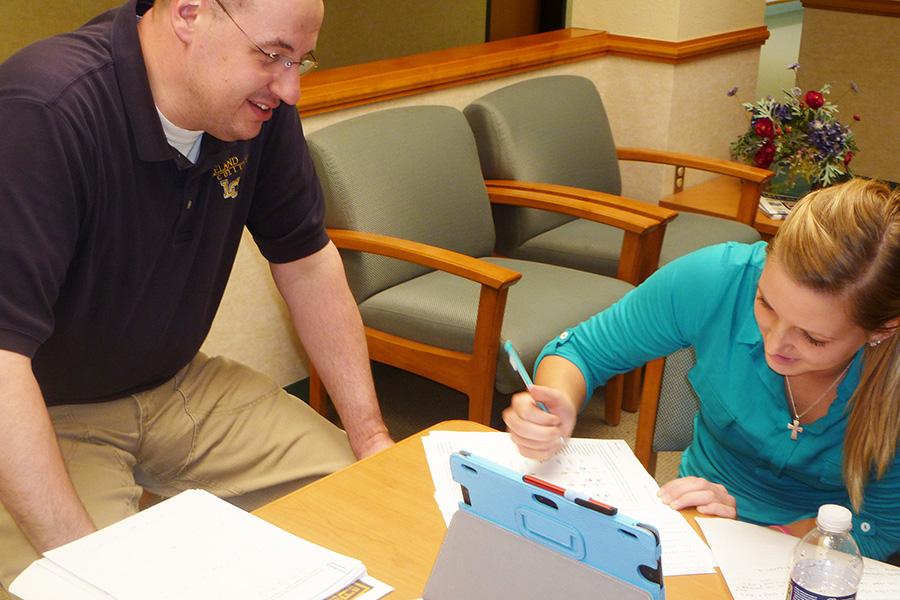Frink doubles workload, maintains personal touch with students
Brian Frink, professor of chemistry/physics, has taken on a double load of classes with no complaint.
April 24, 2014
Any student who has had Brian Frink, professor of chemistry/physics, knows he goes the extra mile to make sure students are understanding the content he is teaching. However, this semester Frink was given the opportunity to teach many of Jeff Schwem’s classes, a decision made by him, his colleagues and the college. The college was faced with a difficult situation when Schwem took a new teaching position closer to his family.
“We wanted to get the students the best that we could offer in the amount of time we had…. The classes needed to be taught for students to graduate. The college and myself wanted to make sure that none of the students were negatively impacted,” says Frink.
The classes Frink picked up are Principles of Chemistry I and II, Thermodynamics and Kinetics, and Chemistry for the Everyday, which totals 17 credits and includes labs, excluding his normal teaching workload. Other professors also took a larger workload to cover all of the classes, such as Paul White, director of the Hayssen Academic Resource Center & assistant professor of general studies, teaching Core III and Jeff Elzinga, general studies division chair and professor of writing, teaching Core IA and B.
As for Frink’s increased workload, being available to students for extra help became challenging.
“I have learned that where my students benefit the most is when I get a chance to work with them on a one to one basis,” explains Frink.
Frink recalls when he was a student with a teacher who had a hectic schedule.
“One of the faculty who really inspired me in a positive way actually taught a class at the last minute for a professor who could not teach it due to health reasons. The two things that inspired me about him [were that] he cared enough about us that he taught the class even though it didn’t really fit into his schedule and … that he made sure that he spoke to us personally as opposed to running us through TAs. So I knew that the personal contact that I had from him was genuine, as opposed to looking like he didn’t care by putting a partial barrier up. He wanted us to come directly to him.”
Frink tries to follow that professor’s example by being open to students, despite his limited time.
“I always try to be accessible to my students as much as possible and try to make sure that I don’t outpace them, which is sometimes difficult because you have certain amounts of things you need to get through. It is key to strike a balance between pushing students hard and showing them that you care, which can get them the furthest. If all you do is push them, they are going to resent you, but if you care and don’t push them, then they are great friends of yours, but they don’t necessarily become better because of it. So you have to strike a balance, so that the student improves to the most they can improve by making them want to come on the journey with you, when you push them as hard as you can.”
In addition to limited time for students, Frink also has less time for his family.
“There are certainly downsides to taking on more work for anybody, there is only an infinite number of minutes in a day and everything that you do takes a certain amount of time. You find balance only in that you find people who are willing to understand your situation and give you more leeway than they normally would. If that means that my kids understand that I am not as available as I normally am, then they are giving me more leeway. But at the same time, my students have been very good at respecting the fact that I have a family. I need to be a dad too.”
In the end, Frink made the decision to benefit the needs of the students.
“I became a convenient choice, but the focus was the students and their ability to succeed, and get the knowledge they needed and to matriculate on time. The college as a whole, myself, my colleagues inside the department, and across campus had a vision to make sure the student would not feel the loss of a faculty member, but I am sure that they feel it, and the idea was to have them feel it as little as possible,” states Frink.


